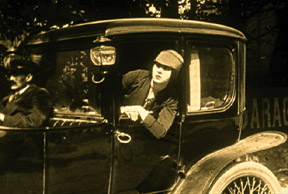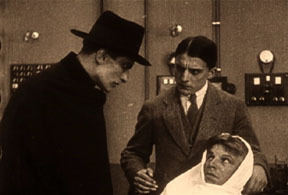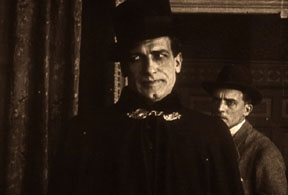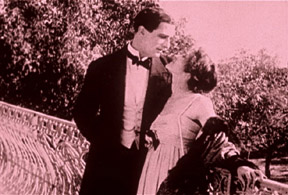

Honesty being the best policy, I'll admit that when Tim,
our Friendly Webmaster, sent me Louis Feuillade's "Judex"
(1916) to review, I groaned, and on two counts:
(1) It's a SERIAL, for crying out loud! We silent film enthusiasts
must proselytize, given our love for what's essentially a dead
art form; and serials -- rather, their concomitant stereotypes
that have distorted people's perceptions of the entire art form
-- stand in our way. As we dangle a silent DVD before our uninitiated
friends and neighbors, promising popcorn,  brownies,
even a drop of the grape in the bargain, they remain skeptical:
"Don't those things have some girl tied to railroad tracks?
Doesn't some genius dog run for help? Doesn't the villain have
a twirly moustache? Isn't there a conveyer belt leading to a buzz
saw somewhere? You mean people took this stuff seriously? Hey,
what are you crying for?"
brownies,
even a drop of the grape in the bargain, they remain skeptical:
"Don't those things have some girl tied to railroad tracks?
Doesn't some genius dog run for help? Doesn't the villain have
a twirly moustache? Isn't there a conveyer belt leading to a buzz
saw somewhere? You mean people took this stuff seriously? Hey,
what are you crying for?"
A serial. Horrors!
(2) "Judex" runs five hours and fifteen minutes. Well,
to a young'un who can spend all afternoon playing video games,
that's nothing. To his grayed counterpart, who finds more covert
thrills in his 401(k) statement than in the swimsuit issue of
Sports Illustrated, that's almost half a day closer to
the obits.
Five hours. Fifteen minutes too. Mercy!
Cut to the chase, you say. How was it?
Well, listen to this: During the course of five hours and fifteen
minutes, I took one fast break -- zip! -- to grab a sandwich
and a Dr. Pepper. Cross my heart, I could not take my eyes off
the screen. As the closing credits rolled, I thought: that was
without doubt one of the finest cinematic experiences I've ever
known. And -- I immediately watched the whole thing all over again.
Bliss, I'm telling you.
Now don't ask for an extended synopsis, for any serial is going to have more twists and turns than an excursion to your local DMV for a license renewal. Suffice it to say that if you know your great literature, you'll be reminded right away of The Count of Monte Cristo as a young man who calls himself Judex plots revenge against the banker who long ago brought Judex's family to ruin, only to find his carefully laid plans thwarted when he falls in love with the banker's daughter. Simple.
 But consider just a few of the
characters whom you'll meet along the way (the cast list overwhelms
at the beginning, but Feuillade takes his time and works in each
character with care). In no particular order, there's Miss Daisy
Torp, a dimpled, fearless circus performer who looks fetching
in her (then) skimpy swimsuit as she braves the waters to save
Judex from the clutches of the dastardly cowards who have him
bound and gagged aboard their ship. There's Kerjean, a moral template
who (with Judex's family) was ruined by the banker, and who searches
for his long lost son with the most haunted eyes you've ever seen:
you hurt for this man. There's the Licorice Kid, a streetwise
child who early on dresses something like Jackie Coogan in "The
Kid" and in manner and underlying vulnerability reminds you
throughout of Dickens's Artful Dodger from Oliver Twist.
(Keep Dickens in mind, by the way, for we're going to return to
him in a minute.)
But consider just a few of the
characters whom you'll meet along the way (the cast list overwhelms
at the beginning, but Feuillade takes his time and works in each
character with care). In no particular order, there's Miss Daisy
Torp, a dimpled, fearless circus performer who looks fetching
in her (then) skimpy swimsuit as she braves the waters to save
Judex from the clutches of the dastardly cowards who have him
bound and gagged aboard their ship. There's Kerjean, a moral template
who (with Judex's family) was ruined by the banker, and who searches
for his long lost son with the most haunted eyes you've ever seen:
you hurt for this man. There's the Licorice Kid, a streetwise
child who early on dresses something like Jackie Coogan in "The
Kid" and in manner and underlying vulnerability reminds you
throughout of Dickens's Artful Dodger from Oliver Twist.
(Keep Dickens in mind, by the way, for we're going to return to
him in a minute.)
There's Diana Monti, played by the beautiful Musidora, a devious
temptress whose role might have taken on overtones of Theda Bara,
but whose sensitive face and restrained acting make her drop-dead
believable -- something true, in fact, of every character
in the serial, for in the entirety of the twelve episodes, there's
nary a whiff of melodrama, nary a bit of the broad, semaphoric
sweep that the uninitiated assume characterizes the acting of
the silent era. And there is Judex himself, played by the tall,
dark, and strong-featured René Cresté garbed in
cocked hat and broad cape. He doesn't have Fairbanksian dash,
if you will; but his large, dark eyes eloquently register the
pain of unrequited love, the zeal of justice sought, and compassion.
And that cape, more glamorous than Dracula's! In his superb essay
included with the DVDs, film historian Jan-Christopher Horak writes
that Cresté "was indeed an object of idolatry and
a fashion maker for contemporary audience of both genders. As
film critics Bardeche and Brasillach noted in 1938, 'In all that
endless history of wrongs righted, nothing really mattered but
Cresté's cape.'"
But much here does matter, of course, not least of which
is some of the loveliest cinematography you'll ever see. No camera
tricks, no special effects, certainly no CGI's -- just Feuillade's
stationary camera recording a mis-en-scene that often takes your
breath away and compels frequent pressing of the "Pause"
button while you sit and admire, much as if you were going through
a photography exhibit at the Guggenheim. Horak opines that "Feuillade's
images of the French  landscape are both
strikingly beautiful and chocked full of visual puns that reveal
the uncanny. Feuillade repeatedly cuts to shots of the red castle,
where Judex has built a secret lair that depicts a beautiful river
valley below. The scene is framed by the ruin of an arch; silhouetted
inside, Judex sees all." The condition of the film stock,
by the way, is quite good for its age and is enhanced by restrained
tinting that never obscures the infinite detail of every shot.
landscape are both
strikingly beautiful and chocked full of visual puns that reveal
the uncanny. Feuillade repeatedly cuts to shots of the red castle,
where Judex has built a secret lair that depicts a beautiful river
valley below. The scene is framed by the ruin of an arch; silhouetted
inside, Judex sees all." The condition of the film stock,
by the way, is quite good for its age and is enhanced by restrained
tinting that never obscures the infinite detail of every shot.
This feast, one for which Heaven make us thankful, doesn't end
there: Feuillade's beautiful images are completed by Robert Israel's
wonderful and acutely responsive score, ranging from a wistful
piano to an impassioned full orchestra. In a thoughtful documentary
accompanying "Judex," Israel discusses his putting together
a score of five-plus hours. Really, Israel deserves nearly as
much credit for his mammoth effort in framing this film with music
as does Carl Davis for his similar undergirding of Abel Gance's
"Napoleon" (1927) when Kevin Brownlow restored that
epic in the early 1980's.
Back to Dickens, however. Like that master of the British novel,
Feuillade peoples his narrative with characters who--for all their
quirks and idiosyncrasies, or perhaps *because* of those very
quirks -- go straight to the heart with their human immediacy:
whether we love or despise them, we take them in. Along with Dickens,
Feuillade takes a derided genre (for Dickens's early novels --
think of The Pickwick Papers, for example -- were serialized
as well) and gives it depth beyond anything we might have imagined,
putting meat on the hoary bones of that genre through humor, reflection,
apprehension, genuine (as opposed to contrived) shock, poignancy
-- the things that make for the immediacy of shared human experience.
And like the great Dickens, Feuillade knows how to bring
his work to a close. You won't find climax with a capital C; rather,
you'll find a dying fall, one all the more moving in its simplicity.
Consider the titles of some earlier chapters of "Judex,"
ones that -- for all the depth within those chapters --
raise the ugly head of assumed stereotype:
THE MYSTERIOUS SHADOW
THE FANTASTIC DOG PACK
THE SECRET OF THE TOMB
THE TRAGIC MILL
THE WOMAN IN BLACK
 Now consider the title of the final
episode:
Now consider the title of the final
episode:
LOVE'S FORGIVENESS
By the closing reel, the undercurrents of revenge, thwarted justice,
and crime have been left far behind as opposing families seek,
and freely give, the blessings of compassion and understanding.
Horak astutely surmises that "the few figures doomed to die
in "Judex" either have no visible family or have betrayed
their familial relations. On the other hand, a villain can be
redeemed because he loves his family. Indeed "Judex's"
final chapters are codas of families reunited, ending lyrically,
quietly and eminently French, like the glorious sunsets above
the red castle." Amen to that.
We owe a great deal to Flicker Alley, who a few years ago gave
us the delightful "The Garden of Eden" (1928), for serving
up Feuillade's masterpiece in a superbly annotated two-disc set.
Perhaps the most deeply satisfying thing about watching "Judex"
is the reminder that though silent film may be an art form often
relegated to connoisseurs and museums, the hidden and ever-emerging
treasures from those years of its being still retain their delight,
their depth, and their ability to speak directly to the heart.
Art, like love's forgiveness itself, reaches out across the years
to astonish and humble.